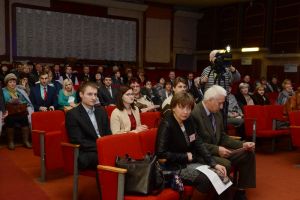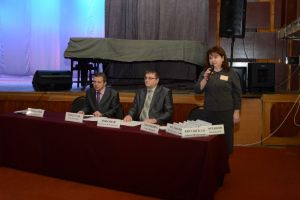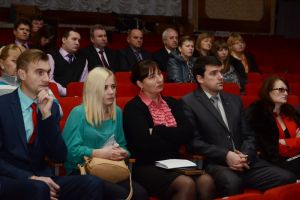The interethnic situation in the region: stability and harmony

 The deputy heads of executive and administrative bodies of municipalities and city districts of Smolensk region, responsible for the sphere of interethnic and interconfessional relations, as well as culture and youth policy professionals discussed today the essential issues of the activity of the local authorities in the sphere of interethnic and interconfessional relations at the seminar organized on the initiative of Governor Alexey Ostrovskiy.
The deputy heads of executive and administrative bodies of municipalities and city districts of Smolensk region, responsible for the sphere of interethnic and interconfessional relations, as well as culture and youth policy professionals discussed today the essential issues of the activity of the local authorities in the sphere of interethnic and interconfessional relations at the seminar organized on the initiative of Governor Alexey Ostrovskiy.
In the welcoming speech, the Head of the Domestic Policy Department of Smolensk region Konstantin Nikonov pointed out that, despite the multiethnic and multiconfessional character of Smolensk region, there has been a stable interethnic situation in it.
Currently there are more than 100 nationalities and ethnic groups living in the region, which is due to the historical and geographical conditions. The Russian population is the most numerous one - 94.7% (according to the 2010 census), the Ukrainian population makes up 1.29% of the total number of people living in the region, the Belarusians - 1.27%, other nationalities - less than 3%. The interests of the national diasporas in the region are represented by 20 non-profit organizations.
 Within the framework of the regional state program "Development of the information space and civil society in Smolensk region for 2014-2016" funds are allocated for the festivals of national cultures, at which, in addition to concerts, exhibitions of national arts, crafts and cuisine are organized. The interaction of public authorities of the region and national associations has a great impact on ensuring interethnic peace and harmony. The state of interethnic relations is permanently monitored, regular meetings with the leaders of national and ethnic associations, non-profit organizations are held.
Within the framework of the regional state program "Development of the information space and civil society in Smolensk region for 2014-2016" funds are allocated for the festivals of national cultures, at which, in addition to concerts, exhibitions of national arts, crafts and cuisine are organized. The interaction of public authorities of the region and national associations has a great impact on ensuring interethnic peace and harmony. The state of interethnic relations is permanently monitored, regular meetings with the leaders of national and ethnic associations, non-profit organizations are held.
The Concept of Migration Policy of Smolensk region for the period up to 2025, approved in April, 2013, as well as the long-term regional target program "Assisting voluntary resettlement of compatriots living abroad to Smolensk region" for 2013-2018 play an important role in addressing issues of interethnic relations.
In order to implement the state policy with respect to the Cossacks in Smolensk region, there is the Coordinating council for the Cossacks Affairs at the regional Administration. The regional  divisional Cossack community of the Cossack Army Society "The Central Cossack army" was set up in the regional center in 2010. The Cossacks actively participate in the social life of the region, including their assistance to the law enforcement agencies in the keeping the public order.
divisional Cossack community of the Cossack Army Society "The Central Cossack army" was set up in the regional center in 2010. The Cossacks actively participate in the social life of the region, including their assistance to the law enforcement agencies in the keeping the public order.
In addition to the state of international relations and the implementation of the state national policy in Smolensk region, the participants discussed the issues related to the procedure of solving the interethnic and interconfessional conflicts, prevention of extremism, residence of the internally displaced persons from Ukraine in the region, and a number of other topics.
Speaking about keeping a stable interethnic situation in Smolensk region, the meeting concluded that ensuring interethnic and interconfessional peace requires further joint work of the organizations and authorities of the region.
